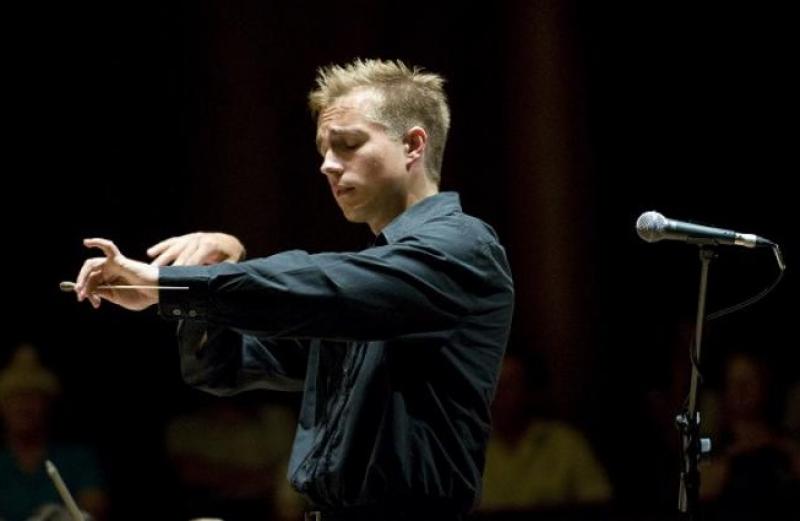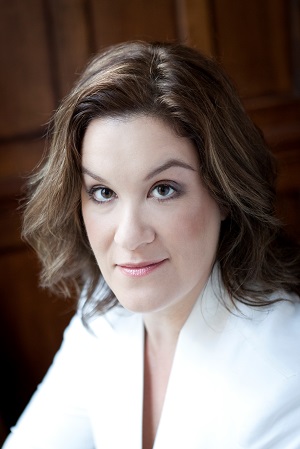Mahler 2, Coote, Tynan, RPO, Petrenko, Royal Albert Hall | reviews, news & interviews
Mahler 2, Coote, Tynan, RPO, Petrenko, Royal Albert Hall
Mahler 2, Coote, Tynan, RPO, Petrenko, Royal Albert Hall
Power and focus from the podium deliver a compelling 'Resurrection'

An auspicious debut with the Royal Philharmonic for Vasily Petrenko. Just watching him conduct, it is clear that he is a natural communicator, always giving a clear, generous beat and never missing a cue. No surprise, then, that the orchestra was on his wavelength from the start last night in Mahler's Second ("Resurrection") Symphony, reflecting back all his dynamism and focus.
Symphonic order was Petrenko’s guiding principle in the first movement. The fierce opening passages were propelled by rugged accents from the lower strings. But then in the second subject, and for much of the development, he brought the dynamics down to a whisper. Tempos remained brisk, but for long stretches a chamber-like intimacy was afforded by the delicacy of the string and woodwind playing. All the better to contrast the gravity of the first movement’s coda. Some real weight from the brass here, easily filling the Albert Hall (no mean feat), but with Petrenko still maintaining brisk, unwavering tempos.
Though the programme told us to expect one, Petrenko wisely dispensed with the five-minute break, pushing on into a similarly driven Andante. His strategy here was to set an austere, if suitably rustic, second movement against a more free-flowing and lyrical third. That contrast was emphasised through the neat phrasing of the woodwinds in the second and the rich portamento of the strings in the third. The orchestra was on good form throughout. Some weaknesses – shaky ensemble, faltering runs – were occasionally revealed in the more exposed passages of these middle movements, but never to the point of distraction.
 More dynamic extremes in the fourth movement, with Alice Coote (pictured left by Ben Ealovega) literally inaudible in her first entrance (perhaps an unintended consequence of placing the soloists behind the orchestra), though growing into a warmly expressive performance, elegantly supported by brass chorales and clarinet. Slow tempos throughout the movement afforded the music breadth, and Petrenko was able to rely here on Coote’s impressive support and tonal control across the lengthened phrases.
More dynamic extremes in the fourth movement, with Alice Coote (pictured left by Ben Ealovega) literally inaudible in her first entrance (perhaps an unintended consequence of placing the soloists behind the orchestra), though growing into a warmly expressive performance, elegantly supported by brass chorales and clarinet. Slow tempos throughout the movement afforded the music breadth, and Petrenko was able to rely here on Coote’s impressive support and tonal control across the lengthened phrases.
The finale was taken at a steady pace, too. That, combined with Petrenko’s care in shaping the phrases, brought a rare precision and clarity to the usually raucous tuttis early on. As in the first movement, underlying structural concerns were revealed as the movement played out, with Petrenko moderating the earlier sections to afford more weight to the climax. Ailish Tynan proved an ideal balance for Alice Coote, similar in tone, but distinguished by a broader vibrato. And the Philharmonia Chorus were spectacular in the closing passages. Yet again, Petrenko took the dynamics down to nothing for their first entry – a magical effect. Chorus, brass and organ all had something saved up for the spectacular ending. Some real bronze church bells were a nice touch, and Petrenko was able to control the dynamics to let them carry across the texture.
No coasting, then, from Petrenko, even in this familiar work. His account was distinctive, well-structured and beautifully paced. Well-communicated too, with the Royal Philharmonic and the Philharmonia Chorus both giving their best. Petrenko is much in demand, and an infrequent visitor to London, but there is clearly chemistry here, and potential for a fruitful artistic relationship ahead.
rating
Explore topics
Share this article
The future of Arts Journalism
You can stop theartsdesk.com closing!
We urgently need financing to survive. Our fundraising drive has thus far raised £49,000 but we need to reach £100,000 or we will be forced to close. Please contribute here: https://gofund.me/c3f6033d
And if you can forward this information to anyone who might assist, we’d be grateful.

Subscribe to theartsdesk.com
Thank you for continuing to read our work on theartsdesk.com. For unlimited access to every article in its entirety, including our archive of more than 15,000 pieces, we're asking for £5 per month or £40 per year. We feel it's a very good deal, and hope you do too.
To take a subscription now simply click here.
And if you're looking for that extra gift for a friend or family member, why not treat them to a theartsdesk.com gift subscription?
more Classical music
 Presteigne Festival 2025 review - new music is centre stage in the Welsh Marches
Music by 30 living composers, with Eleanor Alberga topping the bill
Presteigne Festival 2025 review - new music is centre stage in the Welsh Marches
Music by 30 living composers, with Eleanor Alberga topping the bill
 Lammermuir Festival 2025 review - music with soul from the heart of East Lothian
Baroque splendour, and chamber-ensemble drama, amid history-haunted lands
Lammermuir Festival 2025 review - music with soul from the heart of East Lothian
Baroque splendour, and chamber-ensemble drama, amid history-haunted lands
 BBC Proms: Steinbacher, RPO, Petrenko / Sternath, BBCSO, Oramo review - double-bill mixed bag
Young pianist shines in Grieg but Bliss’s portentous cantata disappoints
BBC Proms: Steinbacher, RPO, Petrenko / Sternath, BBCSO, Oramo review - double-bill mixed bag
Young pianist shines in Grieg but Bliss’s portentous cantata disappoints
 theartsdesk at the Lahti Sibelius Festival - early epics by the Finnish master in context
Finnish heroes meet their Austro-German counterparts in breathtaking interpretations
theartsdesk at the Lahti Sibelius Festival - early epics by the Finnish master in context
Finnish heroes meet their Austro-German counterparts in breathtaking interpretations
 Classical CDs: Sleigh rides, pancakes and cigars
Two big boxes, plus new music for brass and a pair of clarinet concertos
Classical CDs: Sleigh rides, pancakes and cigars
Two big boxes, plus new music for brass and a pair of clarinet concertos
 Waley-Cohen, Manchester Camerata, Pether, Whitworth Art Gallery, Manchester review - premiere of no ordinary violin concerto
Images of maternal care inspired by Hepworth and played in a gallery setting
Waley-Cohen, Manchester Camerata, Pether, Whitworth Art Gallery, Manchester review - premiere of no ordinary violin concerto
Images of maternal care inspired by Hepworth and played in a gallery setting
 BBC Proms: Barruk, Norwegian Chamber Orchestra, Kuusisto review - vague incantations, precise laments
First-half mix of Sámi songs and string things falters, but Shostakovich scours the soul
BBC Proms: Barruk, Norwegian Chamber Orchestra, Kuusisto review - vague incantations, precise laments
First-half mix of Sámi songs and string things falters, but Shostakovich scours the soul
 BBC Proms: Alexander’s Feast, Irish Baroque Orchestra, Whelan review - rapturous Handel fills the space
Pure joy, with a touch of introspection, from a great ensemble and three superb soloists
BBC Proms: Alexander’s Feast, Irish Baroque Orchestra, Whelan review - rapturous Handel fills the space
Pure joy, with a touch of introspection, from a great ensemble and three superb soloists
 BBC Proms: Moore, LSO, Bancroft review - the freshness of morning wind and brass
English concert band music...and an outlier
BBC Proms: Moore, LSO, Bancroft review - the freshness of morning wind and brass
English concert band music...and an outlier
 Willis-Sørensen, Ukrainian Freedom Orchestra, Wilson, Cadogan Hall review - romantic resilience
Passion, and polish, from Kyiv's musical warriors
Willis-Sørensen, Ukrainian Freedom Orchestra, Wilson, Cadogan Hall review - romantic resilience
Passion, and polish, from Kyiv's musical warriors
 BBC Proms: Faust, Gewandhausorchester Leipzig, Nelsons review - grace, then grandeur
A great fiddler lightens a dense orchestral palette
BBC Proms: Faust, Gewandhausorchester Leipzig, Nelsons review - grace, then grandeur
A great fiddler lightens a dense orchestral palette
 BBC Proms: Jansen, Royal Concertgebouw Orchestra, Mäkelä review - confirming a phenomenon
Second Prom of a great orchestra and chief conductor in waiting never puts a foot wrong
BBC Proms: Jansen, Royal Concertgebouw Orchestra, Mäkelä review - confirming a phenomenon
Second Prom of a great orchestra and chief conductor in waiting never puts a foot wrong

Add comment